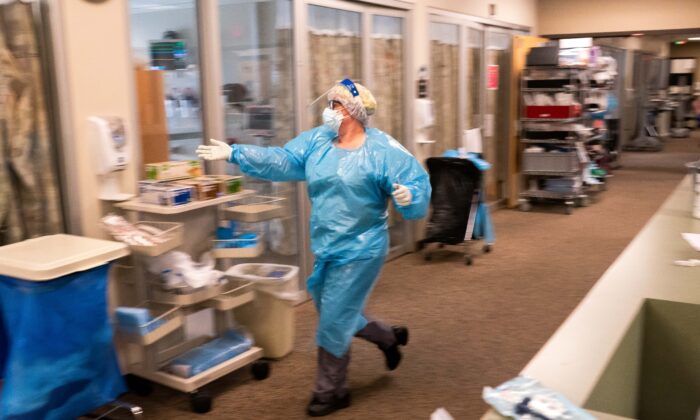


Several hospital systems have re-instated mask mandates as they have cited an increase in COVID-19 cases—while some prominent conservatives have sounded the alarm in recent days.
However, unlike previous iterations, it appears that some of the mask mandates do not apply to patients or visitors—only staff and physicians.
In Massachusetts, UMass Memorial Hospital confirmed in a statement last week that it would re-impose masking for staff. Patients and visitors are exempt from the mandate, it said.
"We have continued to see a dramatic increase in the number of COVID-19 positive employees over the past two weeks, which has led to exposures of both fellow caregivers and patients," the statement said. "In response to this, as a protective measure for our staff and patients, effective immediately we are requiring mandatory caregiver masking for all patient encounters in all licensed clinical areas."
The hospital, which is based in Worcester, said that if the trend keeps up, it might force masks on anyone who comes inside the hospital, including patients and visitors. In four weeks, officials will re-evaluate the COVID-19 situation before making a decision, according to the statement.
"Please know that these changes are not made lightly and we know how that a return to masking may be upsetting for some of our caregivers," UMass Memorial said, local media reported.
Earlier this month, United Health Services in Binghamton, New York, confirmed that it would also again require masks for patients, visitors, staff, and doctors.
"Because of an uptick in COVID-19 cases, masks are once again required in all clinical areas at UHS Wilson Medical Center, UHS Binghamton General Hospital, UHS Chenango Memorial Hospital and UHS Delaware Valley Hospital, as well as primary and specialty care sites," United Health Services said on its website.
The policy, imposed last week, is "in effect immediately for all patients, visitors, employees, medical staff, volunteers, students and vendors," it continued to say. "Masks are required at nurses’ stations and in conference rooms within clinical departments, including areas where patients register, wait, transport through, or receive testing and care."
Masks will also be mandated in "common spaces," the announcement added. That includes hospital lobbies, hallways, stairwells, cafeterias, and patient care units.
Elsewhere in the state, Auburn Community Hospital in Upstate New York said on Aug. 19 that it would again be requiring masks onsite, coming just about a month after the previous mask mandate ended.
The mandate applies to patients, staff, and visitors, according to the hospital in a statement posted to its website.
"Face coverings are mandatory inside our facilities, regardless of your immunization status," the hospital said. "If you do not arrive with one or yours is deemed inappropriate, a mask will be provided to you. It must be worn at all times and must cover your nose and mouth."
Other than masking, the hospital said that hospitalized COVID-19 patients can only see one visitor at a time and have to wear full personal protective equipment.
A Kaiser Permanente location in Santa Rosa said it will again require masks over what it said was a rise in COVID-19 tests as of Aug. 22. However, days later, the hospital clarified that the mandate only applies to staff and physicians, not visitors and patients.
Kaiser told a local newspaper in Santa Rosa that it is still "strongly encouraging masks for patients, members, and visitors in the hospital and medical offices in the Santa Rosa Service Area in response to this latest increase in COVID-19 cases." But face coverings aren't required for those individuals, it said.
“Our intent was to communicate that as of Tuesday, we have expanded the masking requirement for our employees and physicians to medical offices and clinic settings; we apologize for any confusion among Press Democrat readers,” the hospital said in its updated statement.
“Visitors, patients, and members are strongly encouraged to also wear masks in these settings,” it continued. “We have not changed our masking requirements in the hospital, which have been in effect since April: employees and physicians are required to wear masks and we ask visitors to wear masks when in the hospital.”
As of mid-August, University Hospital in Syracuse re-imposed masking for everyone entering the building. The hospital's mandate was only lifted in late April 2023.
"Effective immediately, mandatory masking is required by all staff, visitors and patients in clinical areas of Upstate University Hospital, Upstate Community Hospital and ambulatory clinical spaces," the hospital said, according to Syracuse.com. "Clinical areas are defined as any location patients gather, wait, transport thorough or receive care."
The hospital said that there has been an increase in staff who are sick with COVID-19 and an increase in hospitalized patients.
Over the past three years, there have been a large number of studies from around the world that suggested masks don't prevent the transmission of COVID-19, while others have suggested that many people wear masks incorrectly.
One study, published in 2020 in the New England Journal of Medicine, stated that its researchers "know that wearing a mask outside health care facilities offers little, if any, protection from infection" and that the "chance of catching COVID-19 from a passing interaction in a public space is ... minimal."
However, some public health officials have said that masks should be recommended or required in hospitals or health care facilities where there are large numbers of individuals who are vulnerable to developing severe COVID-19, including people with weak immune systems and the elderly.


